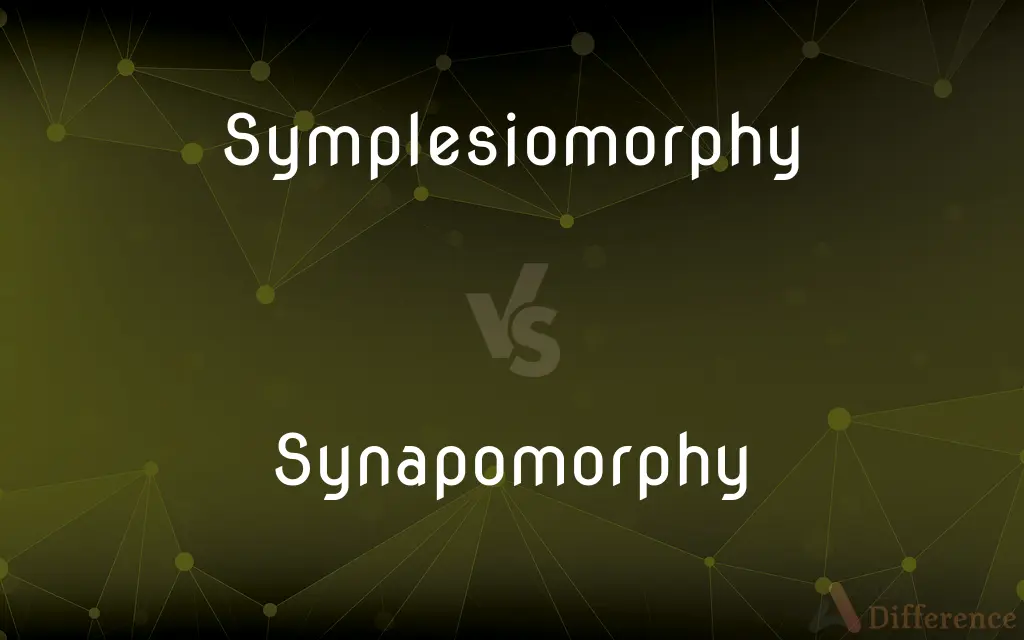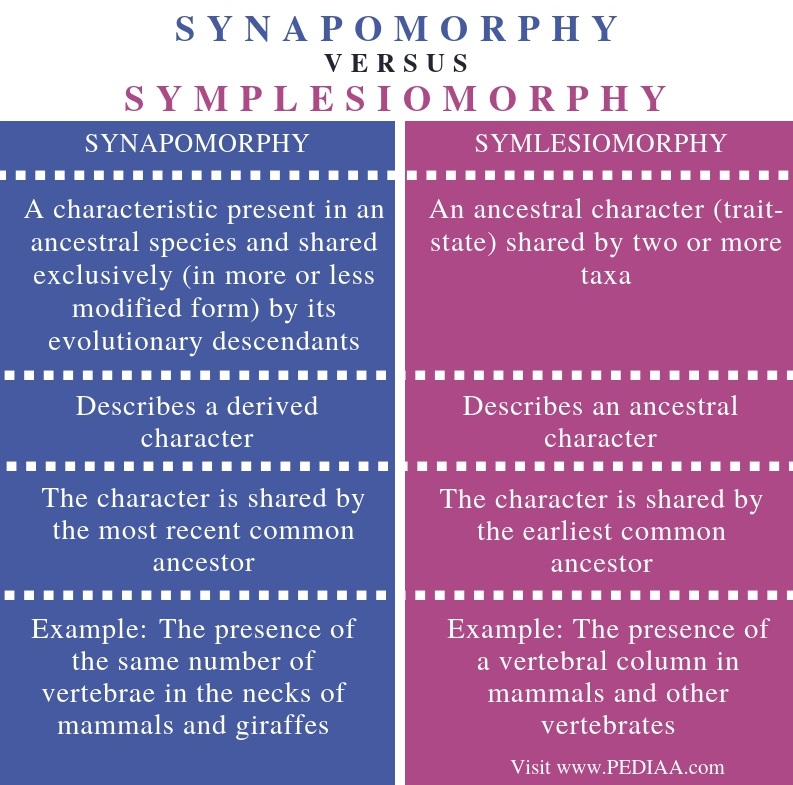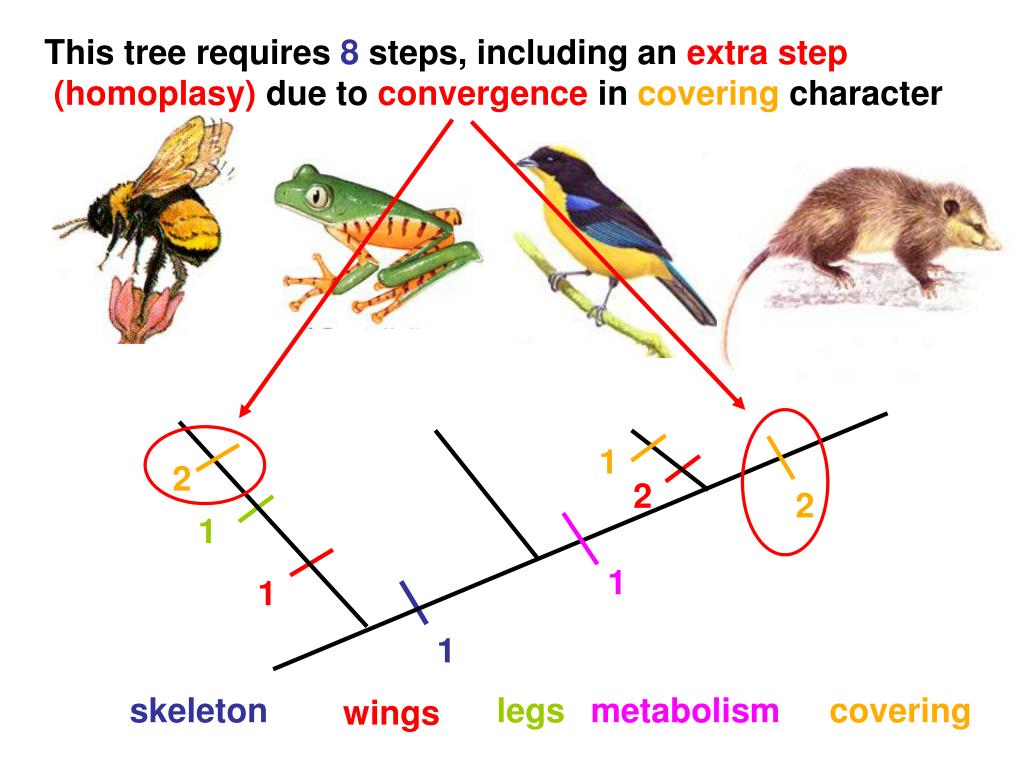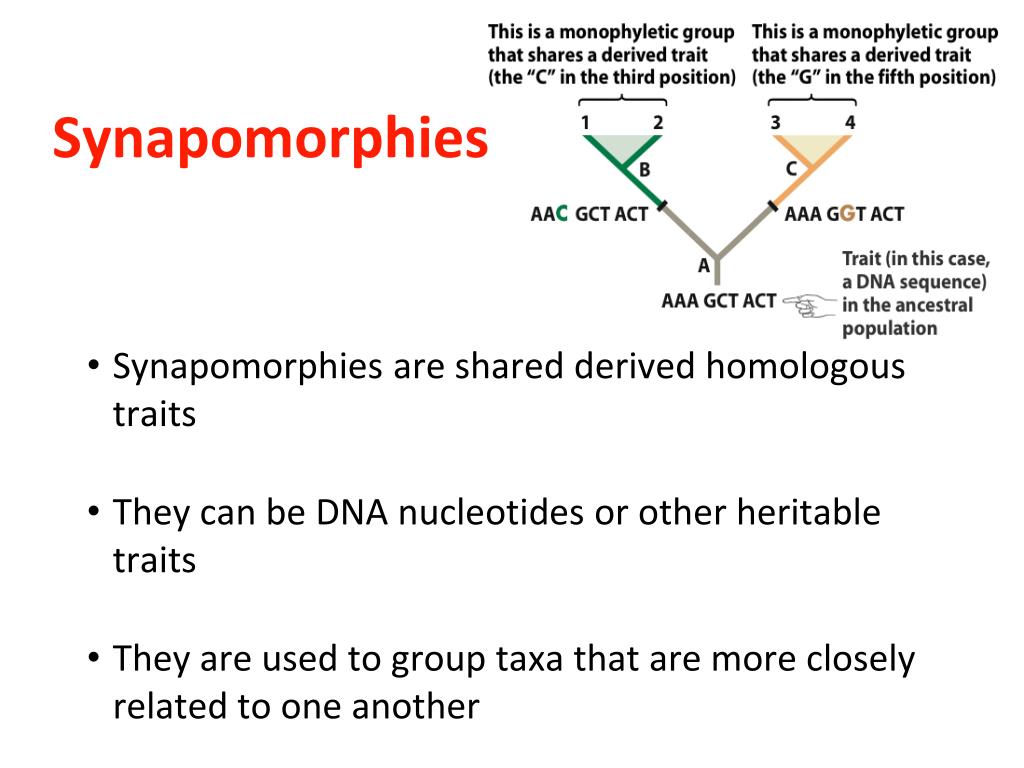
Symplesiomorphy vs. Synapomorphy — What’s the Difference?
[1] In phylogenetics, an apomorphy (or derived trait) is a novel character or character state that has evolved from its ancestral form (or plesiomorphy ). [2] [3] [4] A synapomorphy is an apomorphy shared by two or more taxa and is therefore hypothesized to have evolved in their most recent common ancestor.

PPT 3. The reconstruction of phylogeny PowerPoint Presentation, free
A derived or changed character state (i.e., an apomorphy) shared by two or more lineages in a particular clade. Synapomorphies are indicators of common ancestry. For example, within the clade of terrestrial vertebrates the ancestral, or plesiomorphic, character state is "has four legs." However, both owls and parrots have the synapomorphic character state "has two legs and

PPT Review— Evolution and Phylogeny PowerPoint Presentation, free
Synapomorphy vs. Symplesiomorphy Synapomorphy includes those characters that are shared and derived (those characters may or may not be present in the original or initial ancestors); whereas, symplesiomorphy includes the shared ancestral characters i.e., the characters derived from the initial ancestors.

Synapomorphy Vs Symplesiomorphy PDF Biological Classification
If the unicorn is mythical, then it is immortal, but if it is not mythical, then it is a mortal mammal. If the unicorn is either immortal or a mammal, then it is horned. The unicorn is magical if it is horned. 1 / 4. Find step-by-step Biology solutions and your answer to the following textbook question: Symplesiomorphy vs. Synapomorphy.

What is the Difference Between Synapomorphy and Symplesiomorphy
The yellow tail is a plesiomorphy and symplesiomorphy for all living species. In phylogenetics, a plesiomorphy ("near form") and symplesiomorphy are synonyms for an ancestral character shared by all members of a clade, which does not distinguish the clade from other clades. Plesiomorphy, symplesiomorphy, apomorphy, and synapomorphy, all mean a.

Symplesiomorphy, Synapomorphy, Autapomorphy and Homoplasy. Evolutionary
If you are confused about the terms Synapomorphy and Symplesimorphy you don't have to worry.In this guide, we will elaborate on this term and also discuss Synapomorphy and symplesiomorphy to make…

Reading the Tree of Life Time Scavengers
Symplesiomorphy refers to a shared ancestral trait that is present in multiple groups of organisms. In other words, symplesiomorphies are traits that are inherited from a common ancestor and are shared among different groups of organisms.

PPT What is a synapomorphy? PowerPoint Presentation, free download
In cladistics terms the difference between symplesiomorphy and synapomorphy is that symplesiomorphy is an ancestral trait shared by two or more taxa while synapomorphy is a derived trait that is shared by two or more taxa of shared ancestry. symplesiomorphy English Noun ( symplesiomorphies )

Ch. 23 which traits help us group organisms YouTube
Difference Between Symplesiomorphy and Synapomorphy ADVERTISEMENT Compare with Definitions Symplesiomorphy The possession by two or more organisms or taxa of a shared primitive or ancestral character not exclusive to or characteristic of them in particular; the shared character itself. Sep 03, 2021 Synapomorphy

PPT What is a synapomorphy? PowerPoint Presentation, free download
N&C's (p. 162) argument that plesiomorphy is homology based on "occurrence of the same condition in the most recent common ancestor" is identical in its reasoning to the evolutionary taxonomists argument that paraphyly is monophyly.

PPT Concepts PowerPoint Presentation, free download ID
In addition, synapomorphy and symplesiomorphy might also refer to a character state that refers to the absence of a structure/organ, which creates problems with traditional homology concepts. Hennig's terms synapomorphy and symplesiomorphy are necessary and sufficient for the evolutionary interpretation of character states.

PPT What is a synapomorphy? PowerPoint Presentation, free download
An ancestral character state (i.e., a plesiomorphy) shared by two or more lineages in a particular clade. For example, within the clade of terrestrial vertebrates (in which the ancestral character state is "has four legs"), both elephants and salamanders have four legs — and so having four legs is a symplesiomorphy for those two lineages.

Molecular Dan Graur 1 Objectives of molecular
A same as symplesiomorphy is similarly a shared primitive trait. These terms are defined relative to a particular node (e.g., representing a taxonomic level) on the cladogram. This means that a trait can be a synapomorphy and a symplesiomorphy if different nodes are considered.

PPT Concepts PowerPoint Presentation, free download ID
[1] Imaginary cladogram. [2] The yellow mask is a plesiomorphy for each living masked species, because it is ancestral. [2] It is also a symplesiomorphy for them. But for the four living species as a whole, it is an apomorphy because it is not ancestral for all of them. The yellow tail is a plesiomorphy and symplesiomorphy for all living species.

Trees Wize University Biology Textbook Wizeprep
Homology has no implication on the direction of transformation, whereas symplesiomorphy as "primitive" condition and synapomorphy as "derived" condition refer directly to phylogenesis, the real historical evolutionary process of speciation and transformation.

PPT PowerPoint Presentation, free download ID2112597
Symplesiomorphy, synapomorphy, and autapomorphy Professor Laura 989 subscribers Subscribe 207 Share 7.5K views 2 years ago Evolution Symplesiomorphy, synapomorphy, and autapomorphy,.
